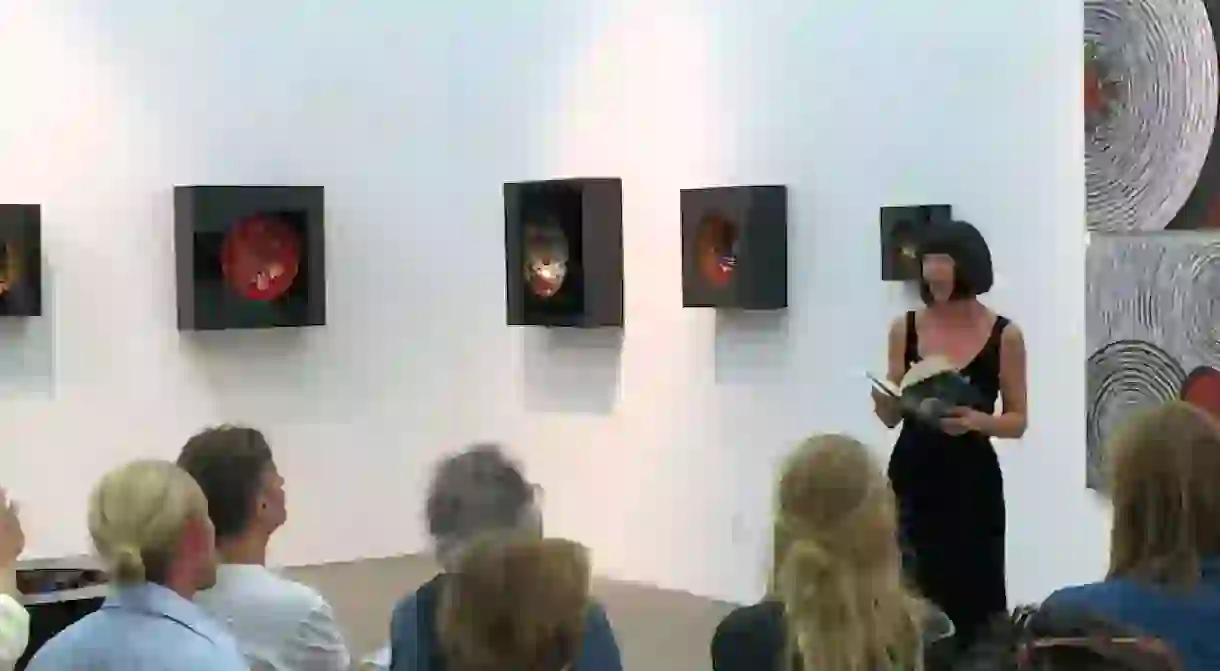10 Los Angeles Poets You Should Know

Not far from the red carpets and shining brass stars of Hollywood lives and breathes another less-talked-about facet of LA: its thriving poetry scene. Los Angeles is a literary hot spot, and considering the diversity and cultural vibrancy contained within the city, it’s not much of a surprise. Here are ten of the most prolific contemporary poets writing in the City of Angels.
Luis J. Rodriguez
Forget about the myth of the lonely poet holed up in an isolated attic. Luis J. Rodriguez is all about connecting with his community. As the current poet laureate of Los Angeles and an urban peace activist, Rodriguez’s work, both on and off the page, emphasizes the importance of political and social awareness. Having grown up experiencing gang violence, discrimination, and poverty in Watts and East LA, Rodriguez’s poetry draws upon his personal history and political participation to evoke powerful, thematically complex works that do not fail to move and inspire readers of all kinds.

Kim Dower
Kim Dower’s poetry has a way of transforming everyday life into something luminous and unexpected. Simultaneously accessible and complex, whimsical and heartbreaking, Dower’s poetry shines with subtle irony and playful imagination. Her poems read like long-forgotten childhood fantasies or strange dreams confused with memories. What makes their silliness and strangeness so genuine to the reader is that they are written in a way that is empathetic and relatable, as well as full of wisdom. Something about Kim Dower’s poetry always seems trustworthy.

Harryette Mullen
Incorporating a unique blend of lyricism, wordplay, and social consciousness in her poetry, Harryette Mullen wants to make sure you don’t take language for granted. She plays with individual words in a way that makes the reader question assumptions about race and gender; many of her poems center on representations of black women. Characterized by a unique musicality, much of Mullen’s poetry draws upon blues, jazz, spoken word, and oral storytelling for inspiration. Challenging and expansive, Mullen’s poetry often incorporates both comedy and tragedy in a single sentence.
Amy Uyematsu
A lifelong Los Angeles resident, Uyematsu’s poetry explores her experiences living and growing up as a Japanese-American woman in SoCal. As the child of parents who had been interned in American camps during World War II, much of her work is informed by her family’s history. Focusing on themes of race and identity, Uyematsu’s poetry deals with her often-conflicting desires to retain her family’s traditional culture while still being a part of the American culture of her environment.
Laurel Ann Bogen
Emotional and intense, Laurel Ann Bogen’s poetry is not afraid to take readers to shadowy corners of sadness and longing. This is what makes her work so relatable and so celebrated. A poetry teacher in a mental health facility as well as a writer herself, Bogen understands the power that poetry can hold as a medium for expression and self-reflection. Famous for her lively readings and imaginative writing style, Bogen’s poetry excites readers both when it is on the page and when it is performed before an audience.

Ramón García
Intensely personal, Ramón García writes about his experiences as a Chicano man in Los Angeles with honesty and fierce intelligence. García’s poems ask many questions, both to themselves and to the reader. Who am I? How did we become ourselves? Why does it hurt so much? García sifts through memories and inspects them for answers. He examines geographies, personal identities, and political histories in order to better understand who he is and where he came from. García maps the odd ache and sadness that often characterizes suburban dystopia.
Jessica Piazza
Self-conscious, haunting, and often painful, Jessica Piazza’s poetry absorbs the reader in its profound examinations of our most basic human struggles. Exploring timeless themes like love, loss, longing, and lust in a contemporary way, Piazza’s poems will seduce you with their truthfulness, as well as their musicality. Jessica Piazza is a master at her craft. Towing the line between traditional form and contemporary experimentation, Piazza’s poems are unique in their skill and confidence. Be sure to check out Piazza for smart, emotional poetry that knows what it’s doing, and does it well.

Eloise Klein Healy
Formerly the first ever Los Angeles poet laureate, Eloise Klein Healy is an important part of the LA poetry scene. Much of her work is inspired by the SoCal landscape and culture, and questions what it means to call LA home. In her poems, Healy incorporates questions about gender and sexuality, global health crises, and environmentalism into an emotional and witty portrait of post-modern life in Los Angeles. Healy’s voice is unique in its explorations of what it means to appreciate the often-strange beauty in the small and the big, in the seemingly banal and the glittering.
Douglas Kearney
Douglas Kearney’s poetry explores what it means to exist with multiple identities: a father, a husband, a consumer, and a black man. How can one person exist with so many different selves? Kearney looks at the complicated relationship between self and others with playfulness, wit, and wisdom. Informed by music and popular culture, Kearney’s poems are assemblages of words and ideas from diverse sources. Kearney understands that as people, we are characterized by contradictions. In his poems, he questions and celebrates the things that make life so confusing, and so human.
Gail Wronsky
Much of Gail Wronsky’s poetry is characterized by a strong sense of place. As a nature lover and resident of Topanga Canyon, LA landscape plays an important part in her work, and reveals the natural side of Los Angeles, in addition to the cultural side we see in the media. At the same time, she manages to invoke dreamy, imaginative works that float like smoke across the page. With a witty voice and keen observations, Wronsky writes about the world she sees with endless compassion and deft perception.
By Ariel Kusby













